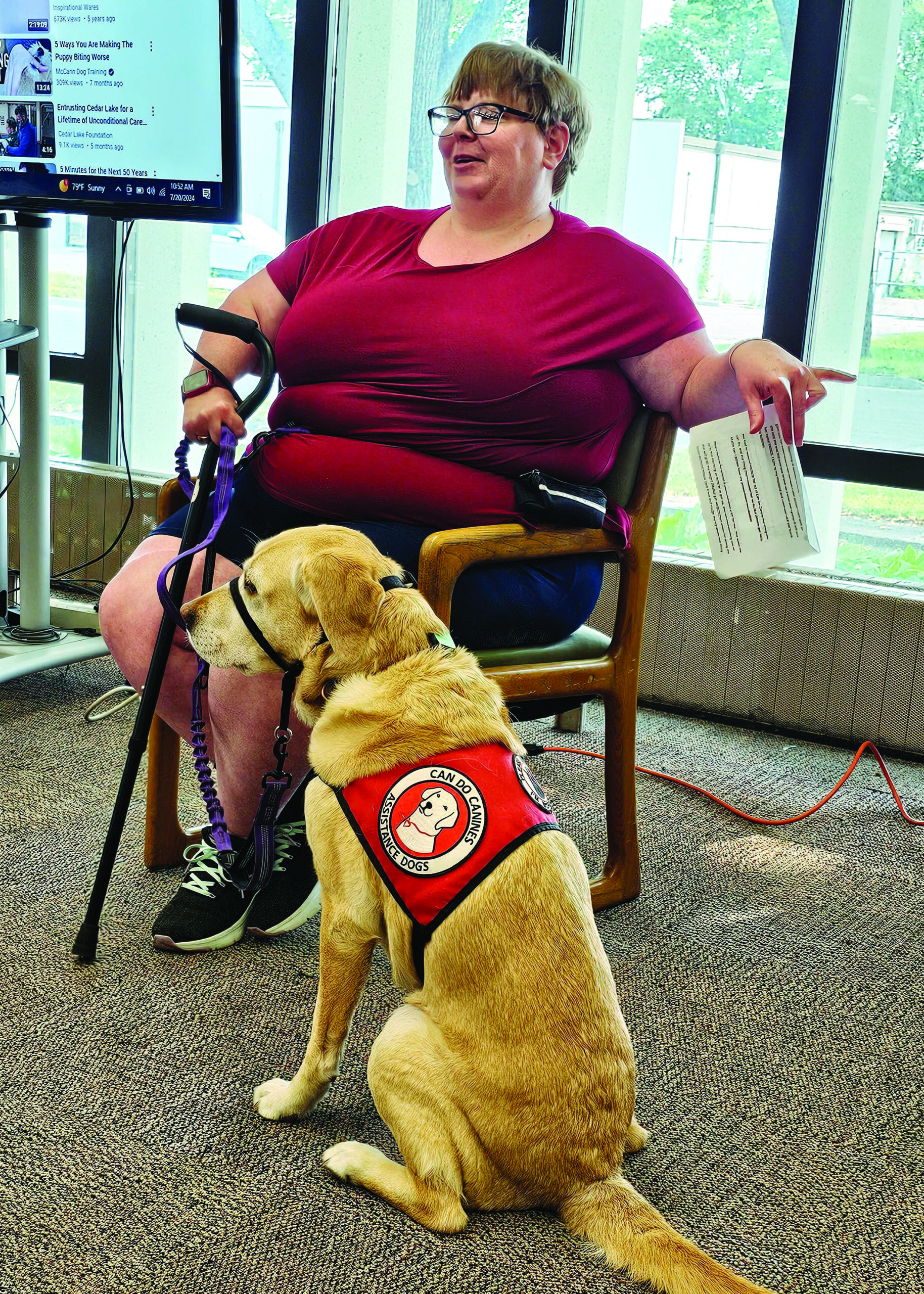Nancy Edmonds Hanson
Amy Sabot always knew she liked dogs. But until she met Mabel, she had no idea how much a pup could change her life.
Mobility issues have plagued her since she was 7 – the year the little girl experienced four strokes in a single day. Doctors discovered she had been born without two essential arteries in her brain; two others were kinked. “I had been like a walking time bomb for seven years,” she says. Experimental brain by-pass surgery partially corrected the problem, but left her partially paralyzed. Subsequent leg surgeries, as well as rheumatoid arthritis and lupus, deepened the challenges.
Enter Mabel. The amiable yellow Lab, who came into the woman’s life six years ago, has changed her life.
“I needed help from the waist down,” Amy explains. “When I bent down, I’d fall. It would take me hours to get up. Now Mabel helps me get back on my feet. If I drop my cane, she picks it up and gives it to me. When I’m feeling weak, she nudges the back of my knee to help me recover my balance. When I’m getting ready to go out, she brings me my shoes – first the right one, then the left.” She adds, “Yes, Mabel knows right and left.”
“Independence … that’s what she has given me,” Amy says, “independence and encouragement. I’m confident to go out by myself with Mabel at my side.”
Amy and Mabel, along with husband Wade Sabot, visited the Moorhead Public Library Saturday to talk about how service dogs improve life for people with many kinds of disabilities.
Now 47, Amy – who lives in Lakeland, Minnesota – had been talking to her doctor for several years about the difference the right trained service dog could make in her life. At his suggestion, she says, the couple called Can Do Canines of New Hope, Minnesota, a 35-year-old charity that trains assistance dogs for people facing problems with mobility, hearing, seizure, diabetes and autism. The dogs are matched with their humans, who themselves receive training in how to work with their canine companions.
To qualify for a dog, the agency required several things of the Sabots: A doctor’s note attesting to Amy’s needs, testimonials from three friends, and finally a personal interview in the Sabots’ home.
The couple learned more at the nonprofit’s Tails to Tell event. “I was awed with what their dogs could do,” Amy recalls. “We met a roomful of dogs. I dropped my cane, and a beautiful girl brought it back to me. That was it. I told Wade, ‘I’m going to get that Mabel.’”
Her husband tried to temper her hopes: “I don’t want to burst your bubble, but remember, you may not get her. There are lots of dogs.”
But one month later, they got the call they awaited. “We have a dog for you,” the woman from Can Do Canines told a thrilled Amy. “Her name is Mabel.”
Amy trained with her new dog in New Hope for several weeks, followed by several more at home. It was clear from the start, she declares: “We were made for each other.”
When she’s off duty, Mabel is relaxed and playful – a pet like any other. But when her human straps on her red jacket, the canine is all business. Her attention is laser-focused on the woman she serves.
People who spot Amy and Mabel in public – especially children – are drawn to the pair. The protocol, however, is very clear: “Don’t come up to the dog. No touching her. No interaction with her,” Amy explains. “She should never be distracted. She is watching me.”
Service dogs like Mabel, Amy explains, are different from emotional support animals. To earn the designation, they must be able to perform specific tasks. There’s no paperwork or licensing required. Instead, those questioning their access to public spaces – as regulated by the Americans with Disabilities Act – can ask only two questions: “Is this a service dog?” “What tasks can they do?”
Amy’s faithful dog has woven her way into every moment of her human’s life, always learning new ways to make life easier. “She wakes me up in the morning. She lies at my feet. If she thinks I’m getting cold, she grabs a blanket and drags it over to me,” the woman says fondly. “At night, I’ll feel ‘tuck tuck tuck’ – she tucks the blanket in around me until, as my husband says, I look like a burrito.”
And Mabel has eased Wade’s mind, too. “He used to text me all the time when he was at work – ‘how are you doing?’” Amy reports. “Now he doesn’t worry so much. Whenever I am with Mabel, I am OK.”
For more information on Can Do Canines, go to www.candocanines.org.



